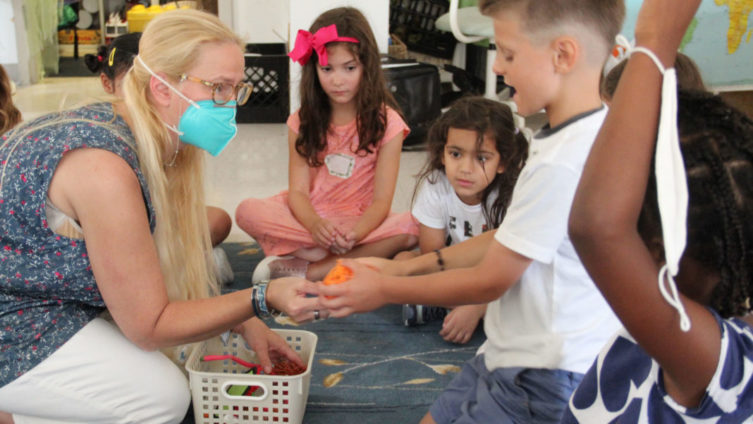
At The Children’s School, we often say “play is serious learning,” and our early-learning through eighth grade school community seeks to preserve childhood for all of our students. For over 50 years, we have embedded challenging and rigorous academics within our nurturing environment.
“The Children’s School encourages our students to be children,” said Head of School Roslyn Benjamin. “We want them to continue to enjoy learning for learning’s sake, not because they’re trying to get an “A” on a test, but because learning is fun, and it means making mistakes at times. Giving students the room to make mistakes is really important at an early learning through grade 8 school like TCS.”
The comfort that is born from a supportive classroom experience allows our students to be challenged, to stretch and develop competence and confidence, while maintaining their love of learning.
“We make sure that all of our students are nurtured and that they feel supported and that they also feel challenged,” said Roz. “We want our kids to be stretched, to have to think critically, to wrestle with material and try to understand it, but you don’t want them to be so stressed that they stop learning and can’t grapple with a problem.”
At TCS, we embrace play because we know it’s how children learn best. In a preschool classroom, you may see students building and running a restaurant. They are organizing themselves around their roles; deciding how much to charge and who is collecting the money; cleaning up the area and serving food; and navigating conflict when something doesn’t go according to plan.
“These are all skills that we actually use in all of our work as adults, and they’re all connected to this notion that that develops through play,” said Director of Lower School Elena Jaime. “It’s one of the reasons why play is so valuable as an indicator of how children are going to learn how to be learners.”
As TCS students get older, play gives way to playfulness. Students are able to go deeper into content as they explore topics and solve problems using a hands-on project-based learning approach. The research shows that learning this way leads to deeper academic understanding and content retention.
“I wanted (our daughter) to go someplace where she could be challenged and really have a love of learning,” said alum parent Jill Luse. “My primary concern was that she would be in a safe learning environment where she could thrive and have the freedom and confidence to mature, grow, and adopt this love of learning. She definitely had that at TCS.”
Each and every day our students tackle things that are hard. Whether it’s hard mentally and intellectually, physically, or socially and emotionally, TCS students are completely engaged in their learning, and they’re having fun while doing it. We call this type of learning “hard fun.”
“One of the magical pieces of TCS is that the learning is fun,” said Roz. “We call it ‘hard fun’ because it’s engaging, and it really pushes students to develop the skills that they’re going to need for high school, but in a way that makes them understand.”
TCS’s preschool through grade 8 structure allows children to mature gently. Acclaimed researcher, educator, and psychologist, Peter Gray, in his book “Free to Learn: Why Unleashing the Instinct to Play Will Make Our Children Happier, More Self-Reliant, and Better Students for Life” explains how children who are allowed to be children longer are healthier, happier, socially and emotionally stronger, and more resilient. They also better develop critical core competencies that lay the groundwork for academic success.
Roz says, “The beauty of an early learning through eighth grade school is that it allows our youngest students to see what they can grow up to be. But it also allows our older students to remember what it’s like to be a child and to really nurture and preserve childhood is important.”
TCS students leave our school after eighth grade prepared to succeed and thrive at a range of high schools.









